高中英语人教版(2019)必修第一册Unit 4 Natural Disasters Reading and Thinking(共51张ppt)
文档属性
| 名称 | 高中英语人教版(2019)必修第一册Unit 4 Natural Disasters Reading and Thinking(共51张ppt) | 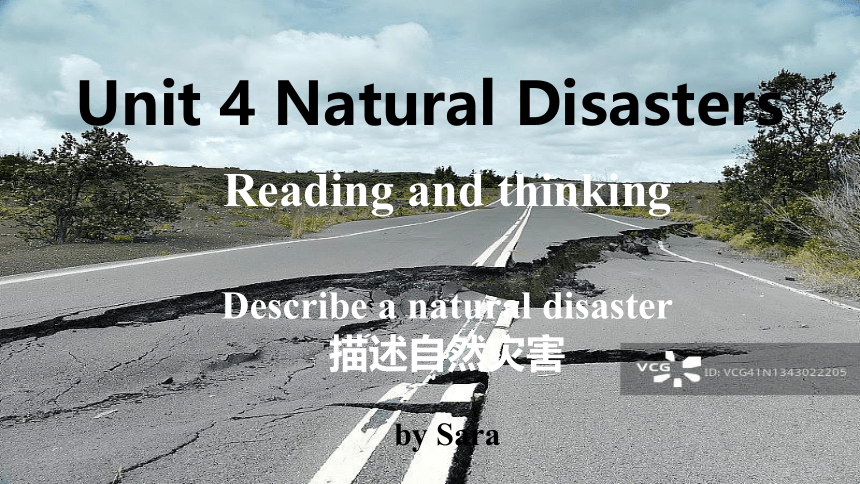 | |
| 格式 | pptx | ||
| 文件大小 | 101.0MB | ||
| 资源类型 | 试卷 | ||
| 版本资源 | 人教版(2019) | ||
| 科目 | 英语 | ||
| 更新时间 | 2024-07-08 08:33:57 | ||
图片预览

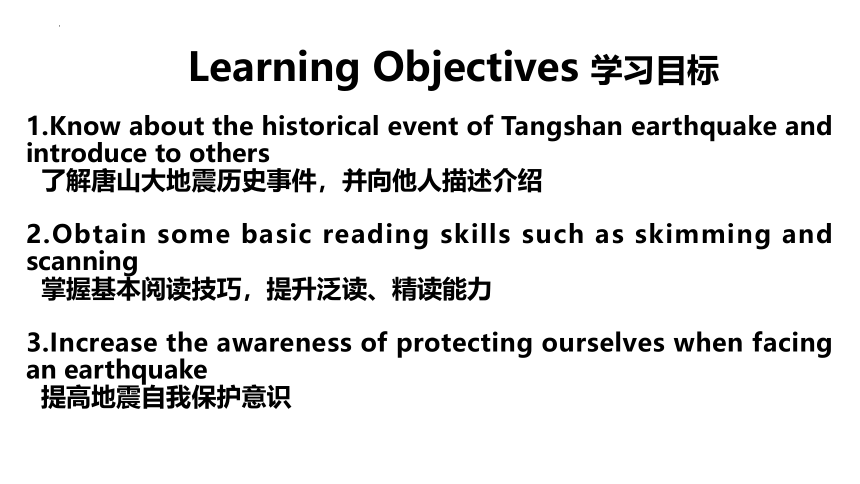

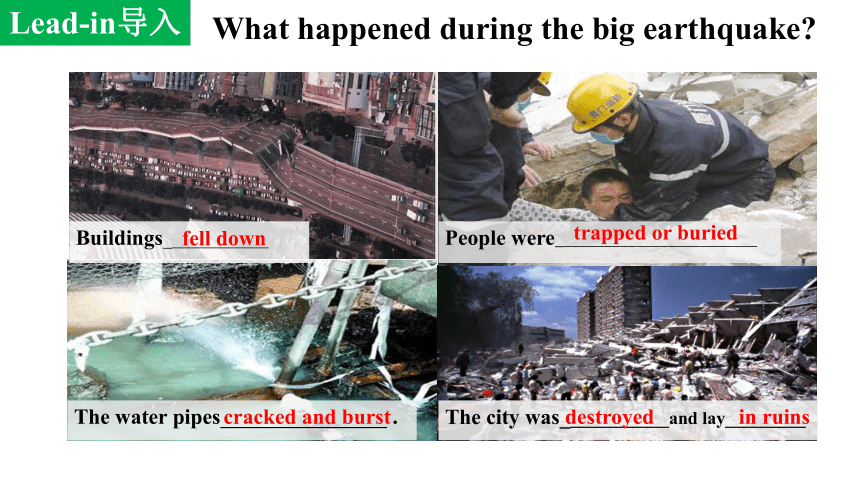
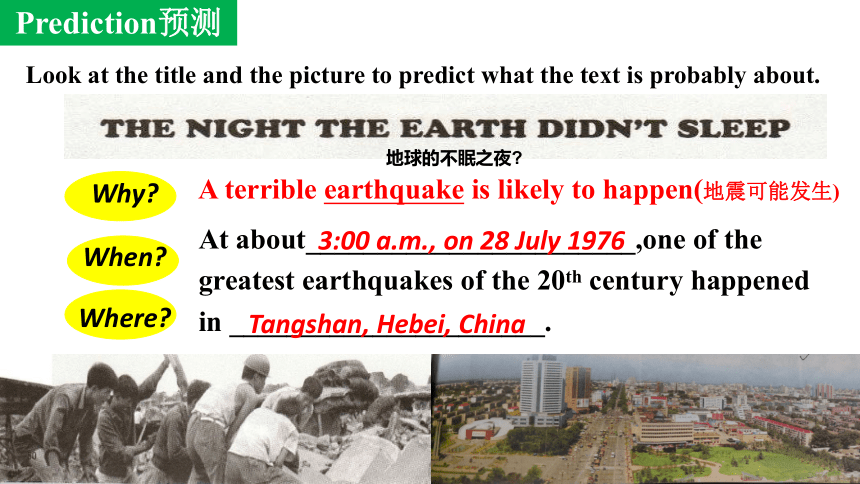
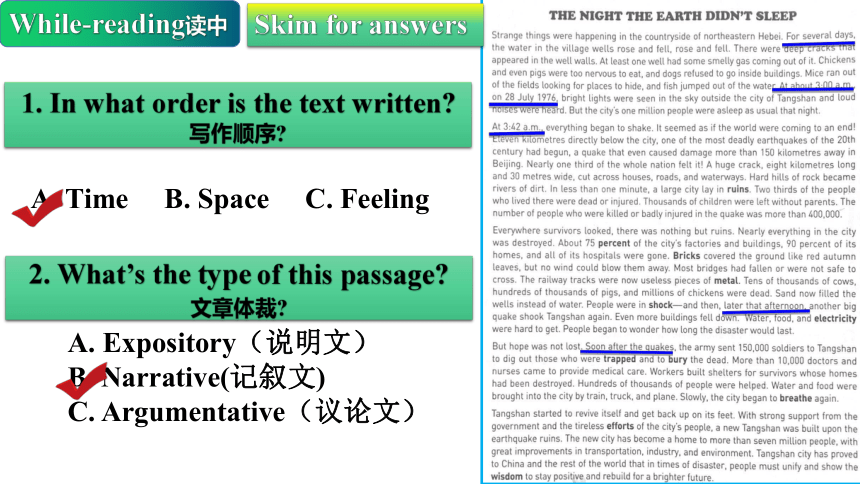
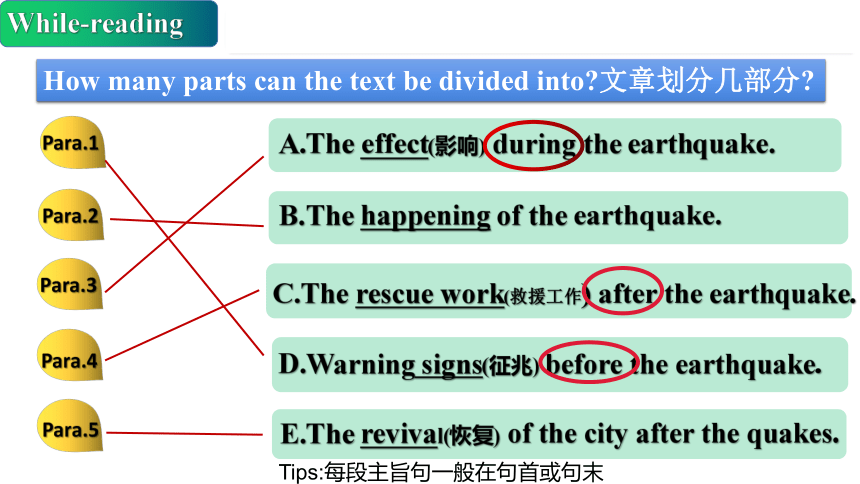
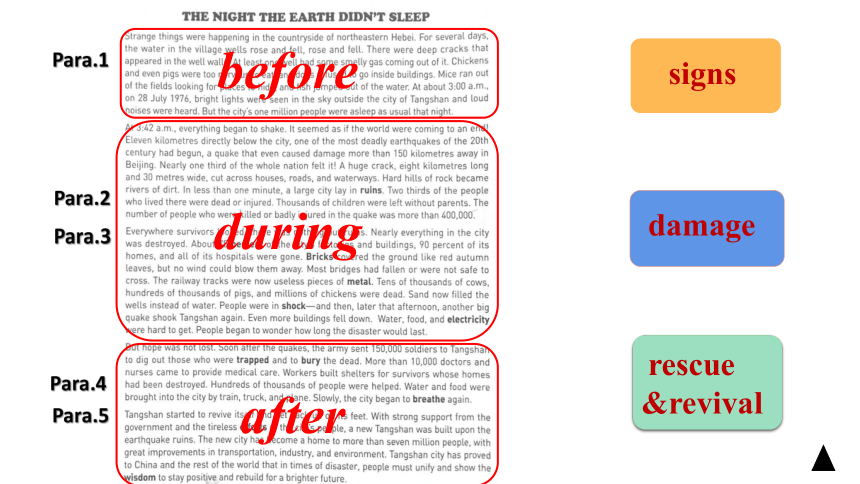
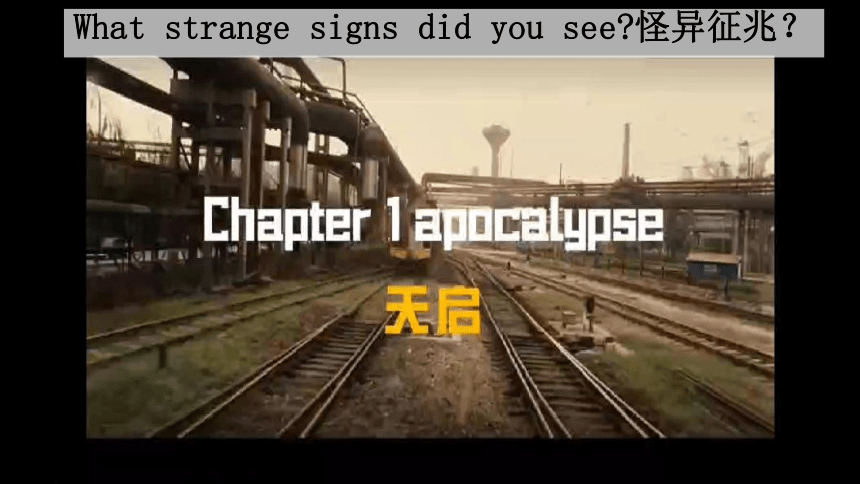
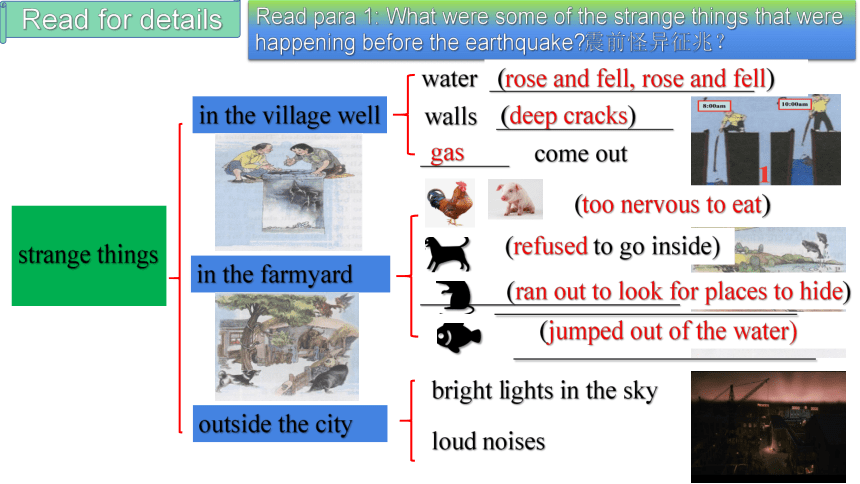
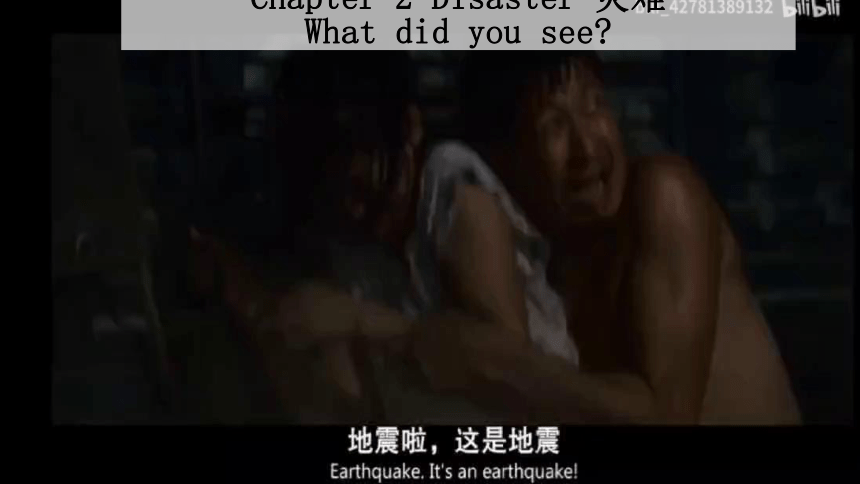
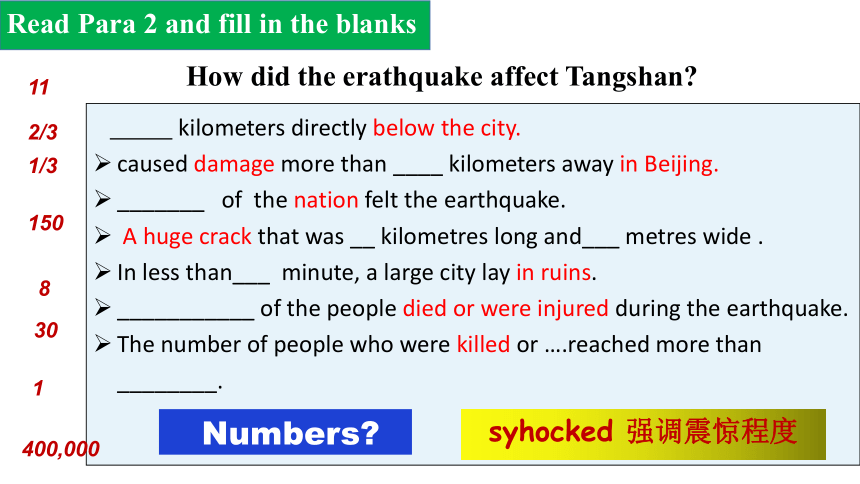
文档简介
(共51张PPT)
Unit 4 Natural Disasters
Reading and thinking
Describe a natural disaster
描述自然灾害
by Sara
1.Know about the historical event of Tangshan earthquake and introduce to others
了解唐山大地震历史事件,并向他人描述介绍
2.Obtain some basic reading skills such as skimming and scanning
掌握基本阅读技巧,提升泛读、精读能力
3.Increase the awareness of protecting ourselves when facing an earthquake
提高地震自我保护意识
Learning Objectives 学习目标
What happened
Warming-up热身
What happened during the big earthquake
Buildings_____________
fell down
People were_________________________
trapped or buried
The water pipes .
cracked and burst
The city was____________and lay_________
destroyed
in ruins
Lead-in导入
When
Where
At about_______________________,one of the greatest earthquakes of the 20th century happened in ______________________.
3:00 a.m., on 28 July 1976
Tangshan, Hebei, China
Why
Look at the title and the picture to predict what the text is probably about.
Prediction预测
A terrible earthquake is likely to happen(地震可能发生)
地球的不眠之夜
While-reading读中
2. What’s the type of this passage
文章体裁
A. Expository(说明文)
B. Narrative(记叙文)
C. Argumentative(议论文)
Skim for answers
1. In what order is the text written
写作顺序
A. Time B. Space C. Feeling
E.The revival(恢复) of the city after the quakes.
Para.1
Para.2
Para.3
Para.4
Para.5
A.The effect(影响) during the earthquake.
B.The happening of the earthquake.
C.The rescue work(救援工作) after the earthquake.
D.Warning signs(征兆) before the earthquake.
While-reading
Read quickly and match the main idea连线匹配段落主旨大意
Find some topic sentences of each paragraphs.找每段主旨句
How many parts can the text be divided into 文章划分几部分
Tips:每段主旨句一般在句首或句末
before
during
after
signs
damage
rescue
&revival
Para.1
Para.2
Para.3
Para.4
Para.5
What strange signs did you see 怪异征兆?
Read for details
Read para 1: What were some of the strange things that were happening before the earthquake 震前怪异征兆?
strange things
in the village well
in the farmyard
outside the city
(rose and fell, rose and fell)
(deep cracks)
gas
(too nervous to eat)
(refused to go inside)
(ran out to look for places to hide)
(jumped out of the water)
bright lights in the sky
loud noises
water _____________________
walls ______________
_______ come out
________________________
________________________
____________________________
Chapter 2 Disaster 灾难
What did you see
Read Para 2 and fill in the blanks
kilometers directly below the city.
caused damage more than ____ kilometers away in Beijing.
_______ of the nation felt the earthquake.
A huge crack that was __ kilometres long and___ metres wide .
In less than___ minute, a large city lay in ruins.
___________ of the people died or were injured during the earthquake.
The number of people who were killed or ….reached more than ________.
1/3
8
30
1
2/3
400,000
11
150
How did the erathquake affect Tangshan
Numbers
syhocked 强调震惊程度
1. It seemed as if the world____________________!
2. Hard hills of rock___________________.
3. Bricks covered the ground____________________. No wind, however, could blow them away.
were coming to an end
became rivers of dirt
like red autumn leaves
Can you find other sentences that show the extreme damage of the earthquake 哪些句子描写地震造成的巨大损失?
exaggeration(夸张)
metaphor
(隐喻)
simile(明喻)
Figure of speech(修辞)
People felt___________ .
frightened
shocked
helpless
hopeless
heartbroken…
to make the description vivid(生动的) and impressive.
75%factories,building 90%homes
100%hospital
were gone
bricks
_________________
water,food
and electricity
_________________
bridges
railway tracks
_________________
cows,pigs
and chickens
_________________
covered the ground
had fallen
were dead
were hard to get
Feeling
Hopeless
Read Para 3 and finish the form.
Chapter 3 metempsychosis涅槃
What is your feeling about this 你的感受?
The army
sent 150,000 soldiers to dig out … bury
The workers
built shelters for survivors whose homes…
Water and food were brought into the city by train, truck and plane.
Doctors and nurses
came …provide medical care
Para 4 _______after the earthquake
rescue
But hope was not lost !
slowly, the city began to breathe again
People from all over the country
Because of the timely rescue, _______________________________________.
Who came to the rescue
What did they do
Chapter 4 Revival 重生
What do you think of the new city 新建城市如何?
Revival of Tangshan
strong support from the government
the tireless efforts of the city’s people.
Various help from the whole nation
unify
Read para.5 and answer the questions.
What do you think helped in the revival of Tangshan city
shocked
hopeful
proud
Thinking
What does the passage convey(传达)
A. No pains, No gains!没有努力,就没有收获
B. All things are difficult before they are easy.万事开头难
C. Where there is a will, there is a way.有志者,事竟成
D. Where there is life, there is hope.有生命的地方,就有希望
Though the disaster
caused severe damage to people’s life, it couldn’t
destroy the love, care and hope among People.
1. 7.8-magnitude earthquake;
2. It hit the city at night
3. People paid no attention to the warning signs.
4. People didn’t have enough rescue knowledge.
5. The buildings and bridges were poorly built.
…
Further Thinking
Why did this earthquake cause such extreme damage(巨大损失)
Don’t be nervous and keep calm.
Don’t try to run out of the classroom.
Sit down under your desk.
Protect your head by putting your bag on your head.
Don’t use lift.
If possible, run to the schoolyard.
Discussion
What can we do before and during the earthquake to reduce damage?
震前震中如何减损?
For us students, we can…
For the government, we think…
Summary 总结
Before During After
(Para.1) (Para.2-3) (Para.4-5)
Signs Damage Rescue&revival
Strange
Shocked
Hopeful
Language points
1.Strange things were happening in the countryside of northeastern Hebei. For several days,the water in the village wells rose and fell,rose and fell. There were deep cracks that appeared in the well walls. At least one well had some smelly gas coming out of it. Chickens and even pigs were too nervous to eat,and dogs refused to go inside buildings. Mice ran out of the fields looking for places to hide,and fish jumped out of the water. At about 3:00 a.m., on 28 July 1976,bright lights were seen in the sky outside the city of Tangshan and loud noises were heard. But the city’s one million people were asleep as usual that night.
定语从句
现在分词作后置定语
too...to...“太...以至于不能”...
refuse to do sth拒绝做某事
run out of 从...跑出来; 用完, 耗尽
n.气味,臭味
现在分词作伴随状语
在乡下
在村里
begin to do sth 开始做某事
begin to do sth 开始做某事
begin to do sth 开始做某事
Language Points:
1.在乡下 .
2. 在村里 .
3. 太...以至于不能 .
4. 拒绝做某事 .
5. 从...跑出来; 用完,耗尽 .
6.从...中冒出来 .
7.像往常一样 .
in the countryside
in the village
too...to...
refuse to do sth
run out of
come out of
as usual
There were deep cracks that appeared in the well walls.
这儿有些裂缝,出现在水井壁上的裂缝。
定语从句
先行词 被修饰的词
定语从句(Relative clauses)
【火眼金睛】:找出定语从句
1. He is a boy who is handsome.
2. She is a girl who is beautiful.
3. I like the room whose window faces the sea.
2. At 3:42 a.m., everything began to shake. It seemed as if the world were coming to an end! Eleven kilometres directly below the city, one of the most deadly earthquakes of the 20th century had begun, a quake that even caused damage more than 150 kilometres away in Beijing. Nearly one third of the whole nation felt it! A huge crack, eight kilometres long and 30 metres wide, cut across houses, roads, and waterways. Hard hills of rock became rivers of dirt. In less than one minute, a large city lay in ruins. Two thirds of the people who lived there were dead or injured. Thousands of children were left without parents. The number of people who were killed or badly injured in the quake was more than 400,000.
begin to do sth 开始做某事
似乎,好像
come to an end 结束
one of +n复数 ...之一
破坏
三分之一的
cut across横穿
成为废墟
三分之二的
成千上万的
...的数量
定语从句
begin to do sth 开始做某事
begin to do sth 开始做某事
begin to do sth 开始做某事
Language Points:
1.开始做某事 6. 横穿
2. 似乎,好像 7. 变为废墟
3. 结束,走向末日 8. 成千上万的
4. ...之一 9. ......的数量
5. 三分之一的 10. 三分之二的
begin to do sth
as if
come to an end
one of +名词复数
one third of
cut across
in ruins
thousands of
the number of
two thirds of
◆焦点句型2 (导P104)
It seemed as if the world were coming to an end! (背)
仿佛世界末日即将来临!
【品句会意】
(1)It seems as _______ the girl has a fever.
那个女孩好像发烧了。
(2)They talked as _______ they had been friends for years.
他们谈起话来就像他们已经是多年的朋友一样。
if / though
if / though
【过关点睛】(导P104)
It seemed as if the world were coming to an end!
as if / though意为“好像;仿佛”,这里引导表语从句
as if / though从句用陈述语气:从句表示的情况是真实的或极有可能发生的。
as if / though从句用虚拟语气,其形式如下:
*从句表示与现在事实相反,谓语动词用一般过去式,系动词be为were;
*从句表示与过去事实相反,谓语动词用“had + 过去分词”;
*从句表示将来的可能性不大,谓语动词用“would / could / might + 动词原形”。
【巧练助记】语法填空
(1) He acted as though he _______ (know) nothing about it.
(2) It seems as if the noise ________ (come) from downstairs.
had known
comes
3. Everywhere survivors looked,there was nothing but ruins. Nearly everything in the city was destroyed. About 75 percent of the city’s factories and buildings,90 percent of its homes,and all of its hospitals were gone. Bricks covered the ground like red autumn leaves,but no wind could blow them away. Most bridges had fallen or were not safe to cross. The railway tracks were now useless pieces of metal.
除...之外;什么也没有;只有
倒塌了
修辞手法:明喻
blow away 吹走
铁轨
碎片
幸存者目及之处无一不是废墟,万物尽毁。市内大约75%的工厂和大楼、90%的住房和所有的医院都倒塌了。砖块就像秋天的红叶覆盖着地面,但是却没有风能将其吹走。大多数桥梁不是坍塌了就是无法安全通行了。铁轨变成了废金属块;
3. Tens of thousands of cows,hundreds of thousands of pigs,and millions of chickens were dead. Sand now filled the wells instead of water. People were in shock—and then,later that afternoon,another big quake shook Tangshan again. Even more buildings fell down. Water,food,and electricity were hard to get. People began to wonder how long the disaster would last.
数万头奶牛、 数十万头猪和数百万只鸡也都死掉了。沙子灌满水井,井水消失殆尽。人们惊恐万状,然而临近傍晚时分,又一次强烈的地震撼动唐山。更多的楼房倒塌了。没有水、食物,电也停了。人们心里开始疑惑这场灾难还会持续多久。。
tens of 成十上百的 hundreds of 成百上千的 thousands of 成千上万的
数百万
而不是
处于震惊中
fall down 倒塌
begin to do sth 开始做某事
how long引导的宾语从句
begin to do sth 开始做某事
begin to do sth 开始做某事
begin to do sth 开始做某事
Language Points:
1.除...之外;只有
2. 吹走
3. 而不是
4. 处于震惊中
5.倒塌
nothing but
blow away
instead of
in shock
fall down
区分 damage, destroy 和 ruin(导P100)
◆ damage 的名词和动词都侧重“损”,表示可修复,常和 badly、seriously 等副词搭配;
◆ destroy 侧重“毁”,表示不可修复,不复存在,
常和 completely、entirely 等副词搭配;
◆ ruin 侧重“毁坏”,使美好的事物失去用途或优良特性,尽管此物仍然存在。
趣味记忆:头发经常烫、染,容易损伤(damage)头发,需要做护理修复。烫坏、烫焦,头发就毁(destroy)了 ,只能剪掉。做个美美的发型出门,遇到大雨,头发还在,但发型被毁(ruin)了。
1. The bus was badly ______________ when it hit the wall.
2. The building was completely ______________ by fire.
3. This illness has _____________ my life.
从方框中选择合适的单词填空。
ruin damage destroy
damaged
destroyed
ruined
热点单词 shock(导P101)
【品句会意】注意下面句子中shock的意思。
(1)I’m in shock. I still can’t believe it’s true.
我非常 ,我仍然不能相信这是真的。
(2)It was quite a shock to see such a mess here!
看到这里如此凌乱,真是 !
震惊
令人震惊
【过关点睛】
shock n.震惊;令人震惊的事(或经历);休克
v.(使)震惊
shocked, adj. (感到)震惊的;惊讶的
shocking ,adj. (令人)震惊的;令人难过的
(2)常用搭配:
吃惊;震惊
对……感到震惊
做某事很震惊
in shock
be shocked at / by
be shocked to do sth
eg. I was shocked _______ (hear) that he had left home.
eg. The ______ (shock) news has spread throughout the community.
to hear
shocking
4. But hope was not lost. Soon after the quakes,the army sent 150,000 soldiers to Tangshan to dig out those who were trapped and to bury the dead. More than 10,000 doctors and nurses came to provide medical care. Workers built shelters for survivors whose homes had been destroyed. Hundreds of thousands of people were helped. Water and food were brought into the city by train,truck,and plane. Slowly,the city began to breathe again.
send sb to do sth 派某人去做某事
dig out 挖出
受困的
医疗护理
成百上千的
成千上万的
begin to do sth 开始做某事
bring into使开始
定语从句
定语从句
修辞手法: 拟人
begin to do sth 开始做某事
begin to do sth 开始做某事
begin to do sth 开始做某事
Language Points:
1.派某人去做某事
2. 挖出
3. 医疗护理
4. 使开始
send sb to do sth
dig out
medical care
bring into
热点单词 trap (导P101)
【品句会意】注意下面句子中trap的意思。
(1)He was trapped in endless troubles.
他 _______ 无尽的麻烦事中。
(2)Before long, the rat fell into a trap.
不久之后,老鼠落入了 ______ 中。
陷入了
陷阱
【过关点睛】(导P101)
(1)trap v. 使落入险境;使陷入圈套;设陷阱捕捉
n. 险境;陷阱;圈套
(2)
陷入……中
被……困住
掉入陷阱
诱骗某人做某事 trap sb into doing sth
He trapped the old into (buy) the dog. 他诱骗老人买了这只狗。
The rabbit (掉入陷阱).
be trapped in ...
be trapped by ...
fall into a trap
buying
fell into a trap
【过关点睛】
(1)power n. 电力;能量;力量;控制力;政权
v. 为……提供动力
powerful adj. 强有力的;强大的
(2)常用搭配:
掌权;执政(表示状态)
上台;执政(表示动作)
在某人的能力/权力范围之内
有能力做某事 have the power to do sth
be in power
come to / into power
within one’s power
(1)The government came _______ power last year.
(2)China is a _______ (power) country.
(3)She has the power (apply for) the job .
to/into
powerful
to apply for
Mary is sitting on a park bench, (bury) herself in her book.
=Mary is sitting on a park bench, (bury) in her book.
7. bury vt.埋葬,安葬 (导P102)
埋头于,专心于 bury oneself in
be buried in
burying
buried
I can’t (breath).
I am (breath).
breathe vt./vi. 呼吸
breath n. 呼吸
breathless, adj 无法呼吸的,气喘吁吁的
吸气/呼气breathe in/out
breathe
breathless
5. Tangshan started to revive itself and get back up on its feet. With strong support from the government and the tireless efforts of the city’s people,a new Tangshan was built upon the earthquake ruins. The new city has become a home to more than seven million people,with great improvements in transportation,industry,and environment. Tangshan city has proved to China and the rest of the world that in times of disaster,people must unify and show the wisdom to stay positive and rebuild for a brighter future.
start to do sth 开始做某事
get up on one’s feet站起来
拟人的修辞手法
不懈的努力
be built upon/on 在...上建立
unify 使成为一体
定语从句
a home to....的家园
in times of 在...的时候
begin to do sth 开始做某事
begin to do sth 开始做某事
begin to do sth 开始做某事
Language Points:
1.开始做某事
2. 站起来
3. 不懈的努力
4. 在...上建立
5.....的家园
6. 在...的时候
start to do sth
get up on one’s feet
tireless efforts
be built upon/on
a home to
in times of
【过关点睛】(导P102)
(1)effort n. 努力;艰难的尝试;尽力;体力;精力
effortless adj. 不费力气的;应付自如的;轻松的
【巧练助记】
(1)I take the bag _______ effort. 我毫不费力地拿起包。
(2)You should .你应该不遗余力学习。
(3)He . 他尽力在学习。
without
spare no effort to study
makes an effort to study
(2)常用搭配:
努力地 with effort
毫不费力地 without effort
不遗余力做某事 spare no effort to do sth
尽力做某事;努力做某事 make an effort/efforts to do sth
【过关点睛】(导P100)
(1)affect v. 影响;(疾病)侵袭;感染;深深打动
(2)常用搭配:
对...有影响 have an effect on
被...打动:be affected by ...
Affected by his story, everyone crys.
被英雄的故事所感动,每个人都流下了眼泪。
【巧练助记】
(1)I was (affect) by his story.
(2)His story (对...有影响) me.
affected
has an effect on
(1)躲避 shelter from
(2)庇护......免于...... shelter…from…
(5)在......的庇护下 under the shelter of
shelter n. 避难所,居所,庇护
vt. 保护,掩蔽 vi. 躲避(风雨或危险)
1.We had a rest the shelter of a big tree.
我们在大树下的庇护下休息
2. The umbrella me rain.
雨伞保护我免于雨水打湿。
under
shelters from
Homework
1. 导:P99-104、106课文二次开发利用(翻译句子不写)
2.预习定语从句:课本P52、110(结合导与练P106、107)
Unit 4 Natural Disasters
Reading and thinking
Describe a natural disaster
描述自然灾害
by Sara
1.Know about the historical event of Tangshan earthquake and introduce to others
了解唐山大地震历史事件,并向他人描述介绍
2.Obtain some basic reading skills such as skimming and scanning
掌握基本阅读技巧,提升泛读、精读能力
3.Increase the awareness of protecting ourselves when facing an earthquake
提高地震自我保护意识
Learning Objectives 学习目标
What happened
Warming-up热身
What happened during the big earthquake
Buildings_____________
fell down
People were_________________________
trapped or buried
The water pipes .
cracked and burst
The city was____________and lay_________
destroyed
in ruins
Lead-in导入
When
Where
At about_______________________,one of the greatest earthquakes of the 20th century happened in ______________________.
3:00 a.m., on 28 July 1976
Tangshan, Hebei, China
Why
Look at the title and the picture to predict what the text is probably about.
Prediction预测
A terrible earthquake is likely to happen(地震可能发生)
地球的不眠之夜
While-reading读中
2. What’s the type of this passage
文章体裁
A. Expository(说明文)
B. Narrative(记叙文)
C. Argumentative(议论文)
Skim for answers
1. In what order is the text written
写作顺序
A. Time B. Space C. Feeling
E.The revival(恢复) of the city after the quakes.
Para.1
Para.2
Para.3
Para.4
Para.5
A.The effect(影响) during the earthquake.
B.The happening of the earthquake.
C.The rescue work(救援工作) after the earthquake.
D.Warning signs(征兆) before the earthquake.
While-reading
Read quickly and match the main idea连线匹配段落主旨大意
Find some topic sentences of each paragraphs.找每段主旨句
How many parts can the text be divided into 文章划分几部分
Tips:每段主旨句一般在句首或句末
before
during
after
signs
damage
rescue
&revival
Para.1
Para.2
Para.3
Para.4
Para.5
What strange signs did you see 怪异征兆?
Read for details
Read para 1: What were some of the strange things that were happening before the earthquake 震前怪异征兆?
strange things
in the village well
in the farmyard
outside the city
(rose and fell, rose and fell)
(deep cracks)
gas
(too nervous to eat)
(refused to go inside)
(ran out to look for places to hide)
(jumped out of the water)
bright lights in the sky
loud noises
water _____________________
walls ______________
_______ come out
________________________
________________________
____________________________
Chapter 2 Disaster 灾难
What did you see
Read Para 2 and fill in the blanks
kilometers directly below the city.
caused damage more than ____ kilometers away in Beijing.
_______ of the nation felt the earthquake.
A huge crack that was __ kilometres long and___ metres wide .
In less than___ minute, a large city lay in ruins.
___________ of the people died or were injured during the earthquake.
The number of people who were killed or ….reached more than ________.
1/3
8
30
1
2/3
400,000
11
150
How did the erathquake affect Tangshan
Numbers
syhocked 强调震惊程度
1. It seemed as if the world____________________!
2. Hard hills of rock___________________.
3. Bricks covered the ground____________________. No wind, however, could blow them away.
were coming to an end
became rivers of dirt
like red autumn leaves
Can you find other sentences that show the extreme damage of the earthquake 哪些句子描写地震造成的巨大损失?
exaggeration(夸张)
metaphor
(隐喻)
simile(明喻)
Figure of speech(修辞)
People felt___________ .
frightened
shocked
helpless
hopeless
heartbroken…
to make the description vivid(生动的) and impressive.
75%factories,building 90%homes
100%hospital
were gone
bricks
_________________
water,food
and electricity
_________________
bridges
railway tracks
_________________
cows,pigs
and chickens
_________________
covered the ground
had fallen
were dead
were hard to get
Feeling
Hopeless
Read Para 3 and finish the form.
Chapter 3 metempsychosis涅槃
What is your feeling about this 你的感受?
The army
sent 150,000 soldiers to dig out … bury
The workers
built shelters for survivors whose homes…
Water and food were brought into the city by train, truck and plane.
Doctors and nurses
came …provide medical care
Para 4 _______after the earthquake
rescue
But hope was not lost !
slowly, the city began to breathe again
People from all over the country
Because of the timely rescue, _______________________________________.
Who came to the rescue
What did they do
Chapter 4 Revival 重生
What do you think of the new city 新建城市如何?
Revival of Tangshan
strong support from the government
the tireless efforts of the city’s people.
Various help from the whole nation
unify
Read para.5 and answer the questions.
What do you think helped in the revival of Tangshan city
shocked
hopeful
proud
Thinking
What does the passage convey(传达)
A. No pains, No gains!没有努力,就没有收获
B. All things are difficult before they are easy.万事开头难
C. Where there is a will, there is a way.有志者,事竟成
D. Where there is life, there is hope.有生命的地方,就有希望
Though the disaster
caused severe damage to people’s life, it couldn’t
destroy the love, care and hope among People.
1. 7.8-magnitude earthquake;
2. It hit the city at night
3. People paid no attention to the warning signs.
4. People didn’t have enough rescue knowledge.
5. The buildings and bridges were poorly built.
…
Further Thinking
Why did this earthquake cause such extreme damage(巨大损失)
Don’t be nervous and keep calm.
Don’t try to run out of the classroom.
Sit down under your desk.
Protect your head by putting your bag on your head.
Don’t use lift.
If possible, run to the schoolyard.
Discussion
What can we do before and during the earthquake to reduce damage?
震前震中如何减损?
For us students, we can…
For the government, we think…
Summary 总结
Before During After
(Para.1) (Para.2-3) (Para.4-5)
Signs Damage Rescue&revival
Strange
Shocked
Hopeful
Language points
1.Strange things were happening in the countryside of northeastern Hebei. For several days,the water in the village wells rose and fell,rose and fell. There were deep cracks that appeared in the well walls. At least one well had some smelly gas coming out of it. Chickens and even pigs were too nervous to eat,and dogs refused to go inside buildings. Mice ran out of the fields looking for places to hide,and fish jumped out of the water. At about 3:00 a.m., on 28 July 1976,bright lights were seen in the sky outside the city of Tangshan and loud noises were heard. But the city’s one million people were asleep as usual that night.
定语从句
现在分词作后置定语
too...to...“太...以至于不能”...
refuse to do sth拒绝做某事
run out of 从...跑出来; 用完, 耗尽
n.气味,臭味
现在分词作伴随状语
在乡下
在村里
begin to do sth 开始做某事
begin to do sth 开始做某事
begin to do sth 开始做某事
Language Points:
1.在乡下 .
2. 在村里 .
3. 太...以至于不能 .
4. 拒绝做某事 .
5. 从...跑出来; 用完,耗尽 .
6.从...中冒出来 .
7.像往常一样 .
in the countryside
in the village
too...to...
refuse to do sth
run out of
come out of
as usual
There were deep cracks that appeared in the well walls.
这儿有些裂缝,出现在水井壁上的裂缝。
定语从句
先行词 被修饰的词
定语从句(Relative clauses)
【火眼金睛】:找出定语从句
1. He is a boy who is handsome.
2. She is a girl who is beautiful.
3. I like the room whose window faces the sea.
2. At 3:42 a.m., everything began to shake. It seemed as if the world were coming to an end! Eleven kilometres directly below the city, one of the most deadly earthquakes of the 20th century had begun, a quake that even caused damage more than 150 kilometres away in Beijing. Nearly one third of the whole nation felt it! A huge crack, eight kilometres long and 30 metres wide, cut across houses, roads, and waterways. Hard hills of rock became rivers of dirt. In less than one minute, a large city lay in ruins. Two thirds of the people who lived there were dead or injured. Thousands of children were left without parents. The number of people who were killed or badly injured in the quake was more than 400,000.
begin to do sth 开始做某事
似乎,好像
come to an end 结束
one of +n复数 ...之一
破坏
三分之一的
cut across横穿
成为废墟
三分之二的
成千上万的
...的数量
定语从句
begin to do sth 开始做某事
begin to do sth 开始做某事
begin to do sth 开始做某事
Language Points:
1.开始做某事 6. 横穿
2. 似乎,好像 7. 变为废墟
3. 结束,走向末日 8. 成千上万的
4. ...之一 9. ......的数量
5. 三分之一的 10. 三分之二的
begin to do sth
as if
come to an end
one of +名词复数
one third of
cut across
in ruins
thousands of
the number of
two thirds of
◆焦点句型2 (导P104)
It seemed as if the world were coming to an end! (背)
仿佛世界末日即将来临!
【品句会意】
(1)It seems as _______ the girl has a fever.
那个女孩好像发烧了。
(2)They talked as _______ they had been friends for years.
他们谈起话来就像他们已经是多年的朋友一样。
if / though
if / though
【过关点睛】(导P104)
It seemed as if the world were coming to an end!
as if / though意为“好像;仿佛”,这里引导表语从句
as if / though从句用陈述语气:从句表示的情况是真实的或极有可能发生的。
as if / though从句用虚拟语气,其形式如下:
*从句表示与现在事实相反,谓语动词用一般过去式,系动词be为were;
*从句表示与过去事实相反,谓语动词用“had + 过去分词”;
*从句表示将来的可能性不大,谓语动词用“would / could / might + 动词原形”。
【巧练助记】语法填空
(1) He acted as though he _______ (know) nothing about it.
(2) It seems as if the noise ________ (come) from downstairs.
had known
comes
3. Everywhere survivors looked,there was nothing but ruins. Nearly everything in the city was destroyed. About 75 percent of the city’s factories and buildings,90 percent of its homes,and all of its hospitals were gone. Bricks covered the ground like red autumn leaves,but no wind could blow them away. Most bridges had fallen or were not safe to cross. The railway tracks were now useless pieces of metal.
除...之外;什么也没有;只有
倒塌了
修辞手法:明喻
blow away 吹走
铁轨
碎片
幸存者目及之处无一不是废墟,万物尽毁。市内大约75%的工厂和大楼、90%的住房和所有的医院都倒塌了。砖块就像秋天的红叶覆盖着地面,但是却没有风能将其吹走。大多数桥梁不是坍塌了就是无法安全通行了。铁轨变成了废金属块;
3. Tens of thousands of cows,hundreds of thousands of pigs,and millions of chickens were dead. Sand now filled the wells instead of water. People were in shock—and then,later that afternoon,another big quake shook Tangshan again. Even more buildings fell down. Water,food,and electricity were hard to get. People began to wonder how long the disaster would last.
数万头奶牛、 数十万头猪和数百万只鸡也都死掉了。沙子灌满水井,井水消失殆尽。人们惊恐万状,然而临近傍晚时分,又一次强烈的地震撼动唐山。更多的楼房倒塌了。没有水、食物,电也停了。人们心里开始疑惑这场灾难还会持续多久。。
tens of 成十上百的 hundreds of 成百上千的 thousands of 成千上万的
数百万
而不是
处于震惊中
fall down 倒塌
begin to do sth 开始做某事
how long引导的宾语从句
begin to do sth 开始做某事
begin to do sth 开始做某事
begin to do sth 开始做某事
Language Points:
1.除...之外;只有
2. 吹走
3. 而不是
4. 处于震惊中
5.倒塌
nothing but
blow away
instead of
in shock
fall down
区分 damage, destroy 和 ruin(导P100)
◆ damage 的名词和动词都侧重“损”,表示可修复,常和 badly、seriously 等副词搭配;
◆ destroy 侧重“毁”,表示不可修复,不复存在,
常和 completely、entirely 等副词搭配;
◆ ruin 侧重“毁坏”,使美好的事物失去用途或优良特性,尽管此物仍然存在。
趣味记忆:头发经常烫、染,容易损伤(damage)头发,需要做护理修复。烫坏、烫焦,头发就毁(destroy)了 ,只能剪掉。做个美美的发型出门,遇到大雨,头发还在,但发型被毁(ruin)了。
1. The bus was badly ______________ when it hit the wall.
2. The building was completely ______________ by fire.
3. This illness has _____________ my life.
从方框中选择合适的单词填空。
ruin damage destroy
damaged
destroyed
ruined
热点单词 shock(导P101)
【品句会意】注意下面句子中shock的意思。
(1)I’m in shock. I still can’t believe it’s true.
我非常 ,我仍然不能相信这是真的。
(2)It was quite a shock to see such a mess here!
看到这里如此凌乱,真是 !
震惊
令人震惊
【过关点睛】
shock n.震惊;令人震惊的事(或经历);休克
v.(使)震惊
shocked, adj. (感到)震惊的;惊讶的
shocking ,adj. (令人)震惊的;令人难过的
(2)常用搭配:
吃惊;震惊
对……感到震惊
做某事很震惊
in shock
be shocked at / by
be shocked to do sth
eg. I was shocked _______ (hear) that he had left home.
eg. The ______ (shock) news has spread throughout the community.
to hear
shocking
4. But hope was not lost. Soon after the quakes,the army sent 150,000 soldiers to Tangshan to dig out those who were trapped and to bury the dead. More than 10,000 doctors and nurses came to provide medical care. Workers built shelters for survivors whose homes had been destroyed. Hundreds of thousands of people were helped. Water and food were brought into the city by train,truck,and plane. Slowly,the city began to breathe again.
send sb to do sth 派某人去做某事
dig out 挖出
受困的
医疗护理
成百上千的
成千上万的
begin to do sth 开始做某事
bring into使开始
定语从句
定语从句
修辞手法: 拟人
begin to do sth 开始做某事
begin to do sth 开始做某事
begin to do sth 开始做某事
Language Points:
1.派某人去做某事
2. 挖出
3. 医疗护理
4. 使开始
send sb to do sth
dig out
medical care
bring into
热点单词 trap (导P101)
【品句会意】注意下面句子中trap的意思。
(1)He was trapped in endless troubles.
他 _______ 无尽的麻烦事中。
(2)Before long, the rat fell into a trap.
不久之后,老鼠落入了 ______ 中。
陷入了
陷阱
【过关点睛】(导P101)
(1)trap v. 使落入险境;使陷入圈套;设陷阱捕捉
n. 险境;陷阱;圈套
(2)
陷入……中
被……困住
掉入陷阱
诱骗某人做某事 trap sb into doing sth
He trapped the old into (buy) the dog. 他诱骗老人买了这只狗。
The rabbit (掉入陷阱).
be trapped in ...
be trapped by ...
fall into a trap
buying
fell into a trap
【过关点睛】
(1)power n. 电力;能量;力量;控制力;政权
v. 为……提供动力
powerful adj. 强有力的;强大的
(2)常用搭配:
掌权;执政(表示状态)
上台;执政(表示动作)
在某人的能力/权力范围之内
有能力做某事 have the power to do sth
be in power
come to / into power
within one’s power
(1)The government came _______ power last year.
(2)China is a _______ (power) country.
(3)She has the power (apply for) the job .
to/into
powerful
to apply for
Mary is sitting on a park bench, (bury) herself in her book.
=Mary is sitting on a park bench, (bury) in her book.
7. bury vt.埋葬,安葬 (导P102)
埋头于,专心于 bury oneself in
be buried in
burying
buried
I can’t (breath).
I am (breath).
breathe vt./vi. 呼吸
breath n. 呼吸
breathless, adj 无法呼吸的,气喘吁吁的
吸气/呼气breathe in/out
breathe
breathless
5. Tangshan started to revive itself and get back up on its feet. With strong support from the government and the tireless efforts of the city’s people,a new Tangshan was built upon the earthquake ruins. The new city has become a home to more than seven million people,with great improvements in transportation,industry,and environment. Tangshan city has proved to China and the rest of the world that in times of disaster,people must unify and show the wisdom to stay positive and rebuild for a brighter future.
start to do sth 开始做某事
get up on one’s feet站起来
拟人的修辞手法
不懈的努力
be built upon/on 在...上建立
unify 使成为一体
定语从句
a home to....的家园
in times of 在...的时候
begin to do sth 开始做某事
begin to do sth 开始做某事
begin to do sth 开始做某事
Language Points:
1.开始做某事
2. 站起来
3. 不懈的努力
4. 在...上建立
5.....的家园
6. 在...的时候
start to do sth
get up on one’s feet
tireless efforts
be built upon/on
a home to
in times of
【过关点睛】(导P102)
(1)effort n. 努力;艰难的尝试;尽力;体力;精力
effortless adj. 不费力气的;应付自如的;轻松的
【巧练助记】
(1)I take the bag _______ effort. 我毫不费力地拿起包。
(2)You should .你应该不遗余力学习。
(3)He . 他尽力在学习。
without
spare no effort to study
makes an effort to study
(2)常用搭配:
努力地 with effort
毫不费力地 without effort
不遗余力做某事 spare no effort to do sth
尽力做某事;努力做某事 make an effort/efforts to do sth
【过关点睛】(导P100)
(1)affect v. 影响;(疾病)侵袭;感染;深深打动
(2)常用搭配:
对...有影响 have an effect on
被...打动:be affected by ...
Affected by his story, everyone crys.
被英雄的故事所感动,每个人都流下了眼泪。
【巧练助记】
(1)I was (affect) by his story.
(2)His story (对...有影响) me.
affected
has an effect on
(1)躲避 shelter from
(2)庇护......免于...... shelter…from…
(5)在......的庇护下 under the shelter of
shelter n. 避难所,居所,庇护
vt. 保护,掩蔽 vi. 躲避(风雨或危险)
1.We had a rest the shelter of a big tree.
我们在大树下的庇护下休息
2. The umbrella me rain.
雨伞保护我免于雨水打湿。
under
shelters from
Homework
1. 导:P99-104、106课文二次开发利用(翻译句子不写)
2.预习定语从句:课本P52、110(结合导与练P106、107)
